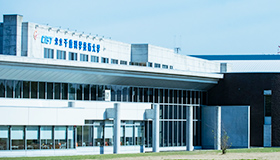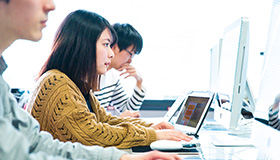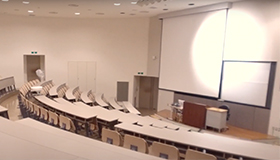Graduate School of Science and Technology
Home - English - University information - Undergraduate and graduate schools - Graduate School of Science and Technology
Science and Technology
In our Graduate School of Science and Technology, various kinds of attractive fields. i.e., applied chemistry, material science, environmental engineering and biotechnology, applied physics, electrical and electronics engineering, information communication engineering, information engineering, software engineering, service engineering, are being studied. For the next generation researchers, it will be required to conduct new advanced research, and further demanded to consolidate broad scope of knowledge to blaze a trail of new field of research. For this purpose, we will be introducing new technologies. e.g., deep learning, artificial intelligence, and cyber security and forming global collaborations in various fields of research to create the next innovations.
Features of the graduate school
At the graduate school, students are immersed in cutting-edge research in a fulfilling environment conducive to the acquisition of more advanced technology and specialized knowledge at the graduate school building equipped with advanced equipment. The aim of the graduate school is nurture world-leading professionals who perform cutting-edge research and play a central role in each field. CIST provides both a Master's and a Doctoral Program in broad field of science under the guidance of teams of professors who are front-line researchers in each field of science.
Point 1. Interdisciplinary research in various science field
A wide range of fields in science and technology are integrated to meet new challenges that are not accommodated in conventional academic fields. In order to resolve these new challenges whose solution cannot be expected to be in current research fields, we conduct the interdisciplinary research collaboration among laboratories in various discipline so that all science and engineering fields are merged. The target research field covers the fundamental and application areas from applied chemistry, environmental science, electrical and electronics engineering, to human-ICT technologies including human engineering and information media.The students can explore various research fields through cooperation between laboratories.
Point 2. Wide selection from diverse research projects
Many and diverse research options including joint research related to international research projects and research themes unique to Chitose are available. The students are supposed to make a pick and start their own research according to their own interests so that professional engineers who can think and act independently and lead advanced research are thus nurtured at the school.
Point 3. Close contact with faculty members
There are good opportunities of attending to international conferences symposiums. The graduate students actively participate in conference, make presentations and guide juniors, which give them encouragement and motivation for studying. By working hard and closely together with professors and other students, students not only pursue the results of their research, but also enhance their humanity needed by society.
Master Course: 2 years standard period
Degree: Master Degree (science and engineering)
The program fosters advanced professionals who can play an active role as engineers in the development of materials, devices, and systems. The students polish up the knowledge and skills of science and engineering and the communication skills to be the core professionals in research and development fields.
Doctor Course: 3 years standard period
Degree: Doctoral Degree (science and engineering)
The program fosters individuals with leadership who will carry out world-class advanced research and development in collaboration with a group of highly specialized experts. The students are expected to engage in a creative research project with world professionals to be global leaders in world cutting-edge research and development.
Curriculum
●…Compulsory subject ■…Elective subject
In addition to specialized subjects and experiments/seminars required for advanced research, the curriculum also includes language subjects that strengthen English proficiency necessary for students to send/obtain the latest information to/from overseas literature and communicate with foreign researchers. There are also “interdisciplinary subjects” to study the social sciences related to science and technology.
In addition to specialized subjects and experiments/seminars required for advanced research, the curriculum also includes language subjects that strengthen English proficiency necessary for students to send/obtain the latest information to/from overseas literature and communicate with foreign researchers. There are also “interdisciplinary subjects” to study the social sciences related to science and technology.
Language subjects
■English Presentation Skill■English for Scientists and Engineers
■Math and Science in English
Interdisciplinary subjects
■Special Lecture on Product Development■Special Lecture on Industrial Property Rights
Exchange experiment subject
■Applied Chemistry and Bioscience Experiment■Electronics and Optical Engineering Experiment
■Information Systems Engineering Experiment
Optical research subjects
●Science and Technology Seminar I●Science and Technology Seminar II
●Science and Technology Seminar III
●Science and Technology Research I
●Science and Technology Research II
●Science and Technology Research III
Specialized subjects
■Structure and Function of the Human Body■Special Lecture on Bio-Medical Photonics
■Organic Materials Engineering
■Polymer Optics
■Molecular Optoelectronics
■Special Lecture on Electronic Optical Materials
■Special Lecture on Quantum Electronics
■Special Lecture on Optical Science
■Special Lecture on Measurement of Optical Properties
■Semiconductor Optical Integrated Device
■Special Lecture on Electronics
■Special Lecture on Optical Communication Technology
■Information and Communication System Theory
■Optic Fiber Network Engineering
■Mechatronics
■Special Lecture on Information Technology
■Special Lecture on Applied Analysis
■Simulation Engineering
■Special Lecture on Medical Informatics
■Special Lecture on Human Factors
■Kansei Engineering
■Special Lecture on Educational Technology



